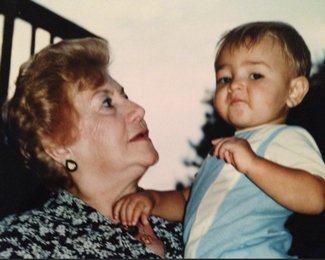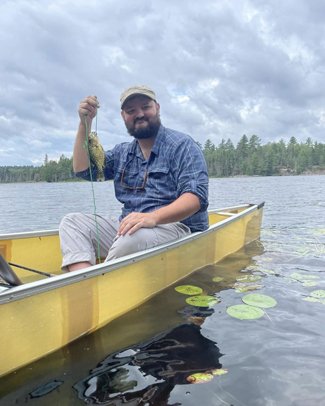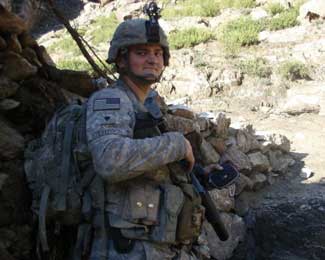My Yia Yia and I Both Endured War. This Is How We Carry It.
Every family has their secrets. Some big, some small. One of ours was that Yia Yia was a bit crazy. And where to begin: One could point to her sudden and animated outbursts of anger in awkward places. Her decades of pill popping that made her loopy and fall over. Her seemingly random religious proclamations. Her lifelong gambling obsession. Her propensity to nick items from stores without paying for them and sometimes get caught.

A young Tyler Stevenson with his “Yia Yia.” Photo courtesy of the author.
It became the inside joke of our family. Whenever a new incident happened and the word of it spread among our family, we shared an ashamed amusement over it. A laugh and sort of exasperated, That’s Yia Yia. It could reach boiling points sometimes, and it was not unheard of to get a call from the police, asking us to come pick her up somewhere and help calm the situation (her) down.
In a high school history class once, my classmates and I were given an assignment common to many other high school students across the United States: I had to interview a relative about their life. The idea was to glean what it was like to be alive during historical events we all inevitably live through. I decided to interview Yia Yia.
I had always known she grew up in Greece. I had known she lived there through World War II. I knew she came to America by way of meeting and marrying my grandfather, an American GI in Europe. I would later learn what brought him to Greece was a U.S. military advisory mission to the Greek monarchy during the Greek Civil War.
Her specific stories that came out during the interview were, to say the least, a shock to my cocksure high school male mind. She recalled being in a field and watching German and Bulgarian soldiers march into her town. She recalled seeing her neighbor executed in the street by Bulgarian soldiers. She told me about watching her mother eat sawdust and breadcrumbs during the Greek famine, and Jewish neighbors disappearing. In one story, she recalled hurrying home one night during the war after staying out past the occupation-imposed curfew. She was stopped by Bulgarian soldiers on patrol. She relayed how they put a gun to her head and brazenly and cold-bloodedly contemplated killing her. She was only saved—believe it or not—because a passing German officer put a stop to what these Bulgarians were doing. It took me decades to realize and wonder if there was more to that story she didn’t say. After all, this is in the context of a war in which literally millions of women were violently raped by soldiers of armies traversing and occupying their towns.

Tyler Stevenson doing what he loves most these days—canoeing and fishing. Photo courtesy of the author.
Not all of her stories were of victimization, however. Some were defiant, maybe even heroic. She told me about how she beat up the wife of the commanding Bulgarian general in charge of the occupation of her town and had to hide for days as soldiers searched for her. She told me about being rounded up with other women in her town, put onto trucks, and driven into the mountains. She survived to tell me the story by jumping out of the truck while it was moving and hiding in the mountains.
Yia Yia was born in 1923. Greece was invaded in 1941. She endured these catastrophic events as she was coming into womanhood. Forgotten or unknown to those outside of Greece, however, was that Greece also had a brutal civil war that began at the end of the Axis occupation and lasted until 1949. It is often considered the first proxy war of the Cold War. Yia Yia really had her youth robbed by almost a decade’s worth of brutal warfare.
Award-Winning Journalism in Your Inbox
My own experience with war came when I was 20. I was sent to Afghanistan as an infantryman and saw war through that lens. I had to fight for my life on numerous occasions. I had close brushes with death. I watched an 18-year-old friend take his last breath with his head in my lap as we sat in a field. I put two other friends into their body bags. I saw civilians caught in the middle of it all. Many stories are too intimate, still too fresh to tell, even to those I am closest to. The tragedies continue after military service as friends die from suicide or substance abuse.

Only after he experienced the horrors of war—and following the death of his grandmother—did Tyler Stevenson begin to feel a camaraderie with her. Photo courtesy of the author.
If surviving war is one journey, coming home is another. Coming home is really the journey of recovery from war. It is a process, not an event. For many, it’s a journey that never ends. A decade-plus removed from my service overseas, I’ve been better able to put much in perspective. I’ve started to realize the similarities between Yia Yia and me. Replace pills with various other substances—legal and maybe not legal. Searching for spirituality in different places. The violent and random outbursts of anger that terrify family members.
Tim O’Brien wrote about the “things we carry” when we return from war. Well, this is how we carry it. The trauma, the guilt, the frustration. It isn’t pretty or neat or easy to explain. How does one even try? To those who have no concept of what it is like to experience war?
Our Journalism Depends on Your Support
Yia Yia passed away in 2015. I didn’t realize most of what I just said until after she passed away. I am not sure how I could have used this knowledge while she was alive. I do think I could have been more patient with her. Maybe I could have listened to more about her life, about what she saw. This is what I often wish for for those around me. I feel a camaraderie with Yia Yia now. An understanding. In a way, it feels like how we spoke about her is how we speak about me. How she acted was inexplicable to much of our family.
But I get it, Yia Yia.
This War Horse reflection was written by Tyler Stevenson, edited by Kristin Davis, fact-checked by Jess Rohan, and copy-edited by Mitchell Hansen-Dewar. Abbie Bennett wrote the headlines.





Comments are closed.